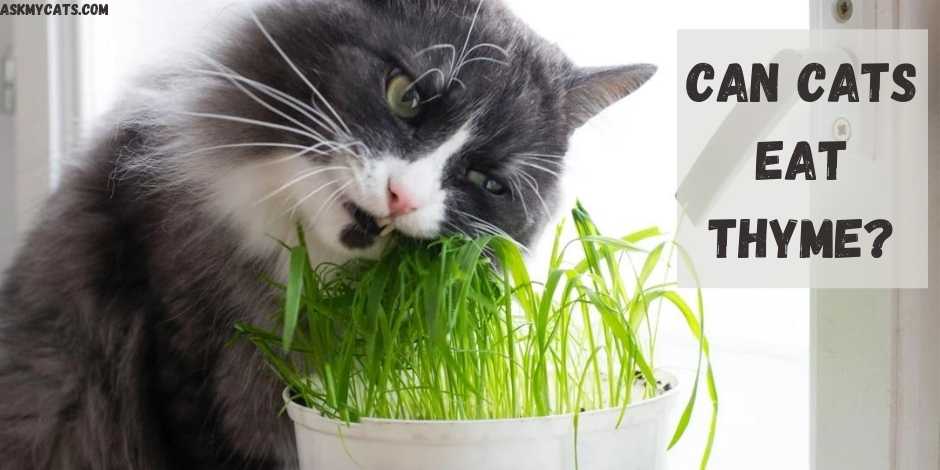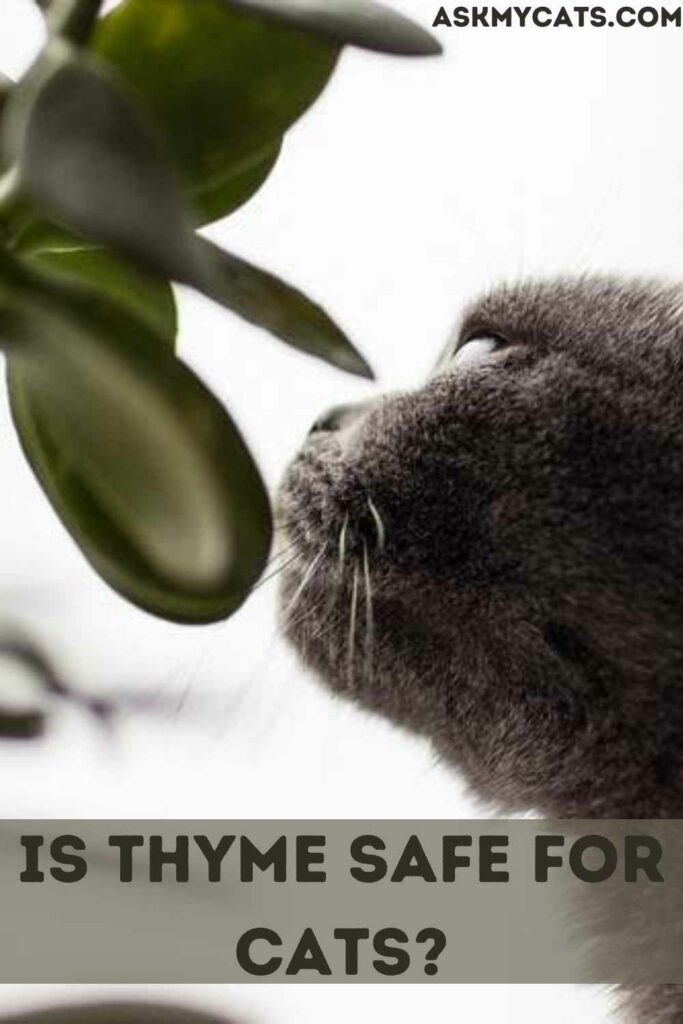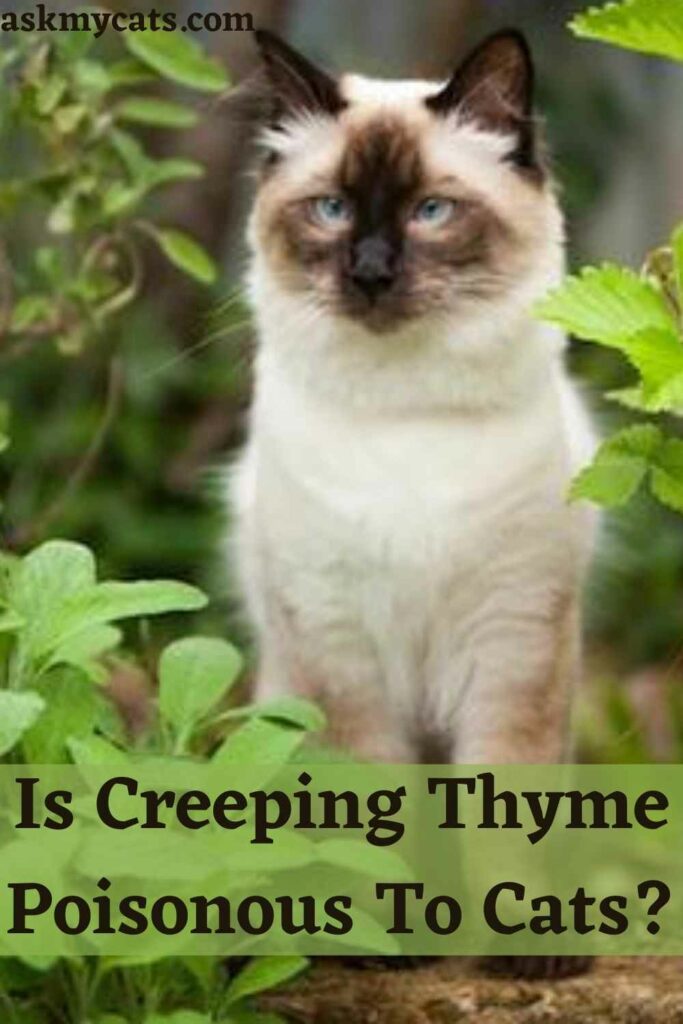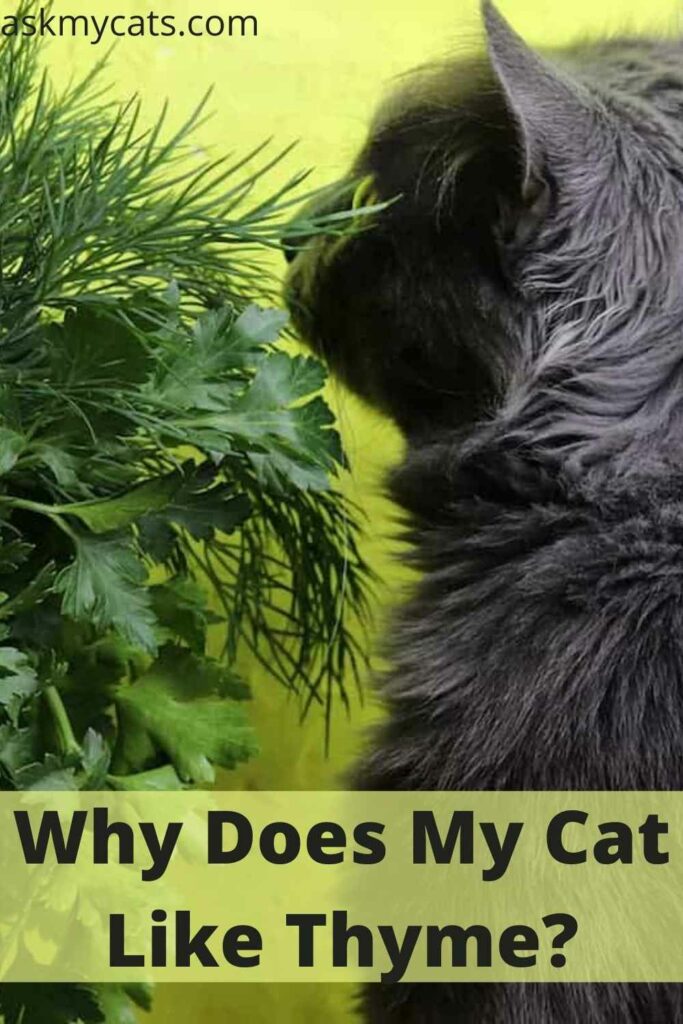Thyme or Thymus is a genus name for about 350 different species of blooming, aromatic herbs, and small shrubs in the Lamiaceae family. It is a blooming plant in the labyrinth family that grows 30–70 cm tall and is common in France, the Czech Republic, and Germany. So, can cats eat thyme?
Yes, cats can eat thyme. According to the American Society for the Prevention of Cruelty to Animals, thyme is not poisonous to cats. If used in moderation, thyme is completely harmless. However, if it is consumed in excess, it might cause intestinal discomfort.
This article will talk about is thyme safe for cats and how much thyme is recommended to feed them.


Give Your Cat the Perfect Day
Get the Free Ebook!
What is Thyme?
Thyme is a blooming plant in the labyrinth family that grows 30–70 cm tall and is widely grown in France, the Czech Republic, and Germany.
Thymol, Carvacrol, and Eugenol are the three important components in Thyme. Thyme flowers bloom from June to October.
Thyme is a blooming plant in the labyrinth family that grows 30–70 cm tall and is widely grown in France, the Czech Republic, and Germany.
Thyme flowers bloom from June to October.
Among the three important thyme components, thymol and carvacrol, according to German experts, play a critical role in boosting the respiratory tract’s immunity to viruses and bacteria.
Furthermore, it significantly lowers the symptoms of respiratory tract infections in children, is antibacterial, and anti-bronchitis.
Thyme leaf is a herb that is used in cooking as a seasoning. Thyme is a versatile herb that may be used in a variety of cuisines. Thyme depends on turkey during the Thanksgiving holiday. Thyme pairs well with fish and veggies.
Teucrium marum (cat thyme) is a little plant with similar-looking leaves to thyme, but it belongs to a distinct genus of plants.
Cat thyme, unlike thyme, has a strong musky odor and isn’t often used in cooking because it has a bitter taste with a lot of heat — it’s known to make people sneeze!
Is Thyme Safe For Cats?
Yes, thyme is safe for cats. However, as a rule of thumb, only give them a very small amount.

Fresh and dried thyme are both fine for your cat to eat, according to the ASPCA.
Thyme is non-toxic to your cat in these forms.
Don’t worry if you notice your cat nibbling on thyme; they won’t be hurt. It’s the same with basil and sage.
If you’re looking for cat-friendly plants in your yard and come across thyme, you can rest comfortably that it’s one of them.
It contains thymol, which aids digestion, inhibits bacterial and fungal growth, boosts your cat’s immunity (vitamin C and antioxidants), and aids in hairball removal.
You can either chop fresh leaves or use powdered dry leaves. They can be sprinkled on your cat’s favorite meal.
Always use an organic source and thoroughly wash new ones before using them. Some cats will enjoy this herb, while others may find its flavor and perfume to be too overwhelming.
Because these creatures are severe carnivores, giving them a lot of this plant will cause indigestion because they lack the necessary digestive enzymes.
If this happens, expect stomach upset, diarrhea, abdominal pain, and maybe vomiting.
Teucrium marum (cat thyme) is also harmless for your cat, so don’t be concerned if your cat eats some and starts wobbling around in a psychedelic trance!
Is Thyme Poisonous To Cats?
Thyme could be poisonous to cat if used in essential oils.
Essential oils have been increasingly popular in recent years, with people utilizing them for cleaning, air freshening, therapeutic purposes, and other uses.
Essential oils, whether applied directly to fur, paws or breathed in through diffusers, can be exceedingly harmful in little dosages for cats because they are small and do not have the same liver enzymes as humans.
This list of essential oils that are poisonous to cats includes thyme essential oils. Do not use essential oils on your cat unless you take extreme measures.
Is Creeping Thyme Poisonous To Cats?
No, creeping thyme is not poisonous to cats according to the ASPCA list of toxic plants.

Cats and other pets are safe with creeping thyme. The creeping thyme isn’t on the ASPCA’s dangerous plants list, but it’s also not on the non-toxic plant’s list.
The FDA, on the other hand, considers the plant to be safe. Many people grow the herb for its culinary uses as well as its reputed healing properties.
Creeping thyme is safe for cats and will not damage them if used in moderation.
Even a small amount of thyme in your cat’s feed is useful since it aids digestion.
But keep in mind that this must be done in moderation. This is because the thymol in creeping thyme is toxic to the nervous system of cats.
Only two to three times a week should you give the cats creeping thyme. This can be a double benefit for gardeners who also have pets.
You may have your creeping thyme beautify your landscape while also allowing your cat to snack on it—a win-win situation.
Why Does My Cat Like Thyme?
Your cat may like thyme because your cat might have found the odor or texture of thyme curious and may have explored the plant and found it to be attractive either due to its flavor, texture, or odor

Thyme (Thymus vulgaris) contains no compounds that might entice your cat to eat it.
Unlike catnip, the shrub is an inconspicuous piece of vegetation from your cat’s perspective.
Your cat, on the other hand, may have been intrigued by the odor or texture of thyme and examined the plant, finding it appealing owing to its flavor, texture, or odor.
As a result, it may take the odd nibble or brush up against the shrub now and then.
If this is the case, your cat is likely to lose interest in the plant soon.
On the other hand, Cat Thyme (teucrium marum) is kitty crack!
It is named after common thyme because of its look, although it smells nothing like it and comes from a different plant genus.
This will interest your cat even more than catnip! In fact, even if your cat doesn’t care for catnip, they might go crazy for this stuff!
What Does Thyme Do For Cats?
Things thyme can do for cats are: –
- Cleans the digestive tract — During self-grooming, your cat may accidentally swallow fur and hair. Thyme can aid in the elimination of hairballs in the digestive tract.
- Thymol, an active ingredient in thyme, kills parasitic worms. It also has anti-helminthic properties. You can use thyme to remove worms from your cat’s gastrointestinal tract under the supervision or guidance of your veterinarian.
- Thymol has been shown to prevent and stop fungal and bacterial infections, in addition to parasitic worms.
- Improve digestive health – your cat’s digestive system will now be healthier thanks to a clean belly free of worms.
Can Cats Have Thyme Oil?
No, cats can’t have thyme oil as it is toxic to them.
The essential oil of thyme is commonly used by humans because it contains antibacterial and antiviral effects. It’s also an effective antibacterial and diuretic.
Because it contains a high concentration of essential oils and phenols, Thymus vulgaris oil is poisonous to cats and should be avoided.
Because cats lack the P450 cytochrome metabolic pathway, it will be difficult for them to eliminate some of the important oil components as well as other chemical substances.
As a result, do not use it for internal or exterior purposes, including worm killing, without first seeing your veterinarian. If it’s absolutely essential, he or she will also show you how to utilize it.
Finally, if your cat consumes this essential oil, consult your veterinarian for treatment options, since it may cause diarrhea, stomach troubles, nervous system symptoms, and other issues.
Can Cats Eat Red Creeping Thyme?
Yes, cats can eat red creeping thyme as it is not toxic to them.
Cats and other pets are safe around red creeping thyme. The creeping thyme isn’t on the ASPCA’s dangerous plants list, but it’s also not on the non-toxic plant’s list.
The FDA, on the other hand, considers the plant to be safe. Many people grow the herb for its culinary uses as well as its reputed healing properties.
Red creeping thyme, often known as fast-spreading thyme, is a drought-tolerant plant that can be used as a groundcover.
Creeping thyme is an invasive weed that can choke out other plants. They have the ability to grow in locations where other groundcovers are unable to.
The red creeping thyme is a lawn enthusiast’s choice because it requires little water and maintenance. The crimson thyme is a one-of-a-kind plant. It emits a lovely scent that stays in the air whenever you step on it.
If used in moderation, red creeping thyme is appropriate for cats and will not harm them. Thyme, even a small bit in your cat’s food, is beneficial since it promotes digestion.
Keep in mind, however, that this should be done in moderation. This is due to the fact that the thymol in red creeping thyme is harmful to cats’ neurological systems.
You should only offer the cats creeping thyme two to three times per week. For gardeners with cats, this might be a double benefit.
Your creeping thyme can enhance your environment while also providing tasty food for your cat, thereby killing two birds with one stone.
Alternative Of Thyme
Some of the alternatives to thyme are:-
- Catnip is first and foremost. This plant is a must-have for cat lovers. Catnip is a cat’s best friend, causing the cat to become excited after eating. It’s a perennial herb with heart-shaped leaves that grows two to three feet tall. It’s known as “mint for cats.” It’s classified as a hallucinogen, although it’s not addictive. Another amazing advantage of catnip is that it repels insects and can be used as a tea to treat minor ailments such as headaches and stomach problems.
- The oat grass is the second. Oat grass is another safe cat food option. It is your responsibility to put the seeds in the appropriate size containers. You’ve succeeded with this delectable kitty dessert after a few weeks.
- Bean sprouts are the third option. Bean sprouts are a safe precaution if you don’t want to meddle with the ideas right now. Bean sprouts aren’t just good for humans; they’re also good for cats.
Frequently Asked Questions
What vegetables can cats eat?
Meat is a favorite food of cats. That isn’t to say that cats don’t consume vegetables. Cats can consume a variety of veggies. The sweet potato is the first root vegetable. In cats, the effect is to help digestion. Carrots are the next vegetable on the list. Carrots contain vitamin A, which helps humans and cats have brighter eyes. Carrots also contribute to the smooth skin of cats; the fiber in carrots dissolves the body’s bad cholesterol. Also, Broccoli is high in Vitamin K, which aids in the prevention of osteoporosis and strengthens bones. Furthermore, a low-calorie diet promotes considerable fat loss.
Does thyme make cats sick?
When you feed the cat too much thyme, it can cause a little health problem. Thymol is present in the plant, and it is toxic to your cat. Thymol, a component of thyme, has a sedative impact on the neurological system of the cat.
Do cats like the smell of thyme?
Ans. Whether, a cat will like thyme or not totally depends on its personality, as sage does not have an overpowering scent to attract the cats.
Final Words
While thyme may have some health benefits for your cat, it is crucial to remember that it is not a required part of his diet.
However, it’s likely that your cat won’t like the taste of thyme at all. You must allow your cat the opportunity to decide whether or not he likes the taste of thyme before forcing him to consume something that contains thyme.
You should never give thyme to your cat without first consulting a veterinarian. Always consult a veterinary practitioner before adding a portion of new food to your cat’s diet.
For any other unanswered questions, ask us in the comments down below.
